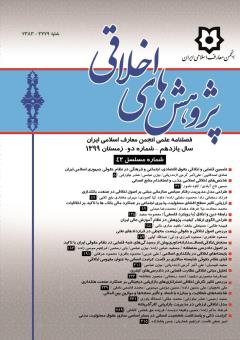کرامت ذاتی و پاسداشت شخصیت انسانی در بستر اساسی سازی حقوق مسئولیت مدنی
محورهای موضوعی : اخلاق و تربیت اسلامیامیر نجفی قامت 1 , ابراهیم شعاریان 2 , حسن پاشازاده 3
1 - حقوق
2 - استاد حقوق خصوصی دانشگاه تبریز
3 - دانشگاه آزاد اسلامی، تبریز
کلید واژه: اساسی سازی, حقوق مسئوليت مدنی, تاثير افقی, حقوق بنيادين,
چکیده مقاله :
فرآيند اساسي سازی حقوق خصوصی، که حاصل تحولات تاريخی، سياسی و توسعه مفهوم حقوق بشر در نيمه دوم قرن بیستم می باشد، به معنای استناد به حقوق اساسی تضمينشده در روابط افقی افراد و تابعان حقوق خصوصی است. نفوذ حقوق بنيادين بشری بر حقوق مسئوليت مدنی ضمن مشروعيت بخشی به قواعد سنتی، زمينه را برای توسعه يا بازتعريف برخي مفاهيم و نهايتاً كارآمدي حقوق مسئوليت مدني فراهم میآورد. هدف اين تحقيق بررسی آثار و نتايج اساسی سازی در حوزه حقوق مسئوليت مدنی به روش توصيفی تحليلی است. به اجمال مي توان گفت به دليل وجود مصاديق مشترک بين مفاهيمی چون حقوق مربوط به شخصيت و حقوق بنيادين، مانند کرامت ذاتی بشر، حق بر سلامت، خود مختاری و استقلال فردی، حق برشهرت و اعتبار و ضرورت حفظ حريم خصوصی که ريشه در فرديت انسان دارند، اين رابطه دو سويه بوده و نسبت به رابطه ديگر شاخه های حقوق خصوصی با حقوق بنيادين، به مراتب عميقتر است ضمن اينکه يک نوع همپوشانی بين اين دو وجود دارد. وضع قوانين بر اساس كرامت ذاتي بشر و ارزش هاي هنجاري، تفسير قوانين موجود بر مبناي عدل و انصاف، حمايت از حقوق و منافع مشروع، بازتعريف مفهوم تقصير، جبران كامل خسارات و توسعه خسارات قابل مطالبه، از جملهآثار اساسيسازي در اين شاخه از حقوق خصوصي است.
The process of fundamentalization of private law, which is the result of historical and political developments and the development of the concept of human rights in the second half of the twentieth century, means invoking the fundamental rights guaranteed in the horizontal relations between individuals and subjects of private law. The Influence of Fundamental Human Rights on Civil Liability Rights, while legitimizing traditional rules, provides the basis for the development or redefinition of certain concepts and, ultimately, the effectiveness of civil liability rights. The purpose of this study is to investigate the effects and results of fundamentalism in the field of civil law and responsibility by descriptive-analytical method. In short, due to the common examples between concepts such as rights related to personality and fundamental rights, such as human inherent dignity, the right to health, autonomy and individual independence, the right to reputation and the need for privacy rooted in individuality. They have human beings, this relationship is two-way and it is much deeper than the relationship between other branches of private law and fundamental law, while there is a kind of overlap between the two. Legislation based on inherent human dignity and normative values, interpretation of existing laws based on justice and fairness, protection of legitimate rights and interests, redefining the concept of fault, full compensation and development of claimable damages, including the fundamental effects of this branch of law. It is private.
